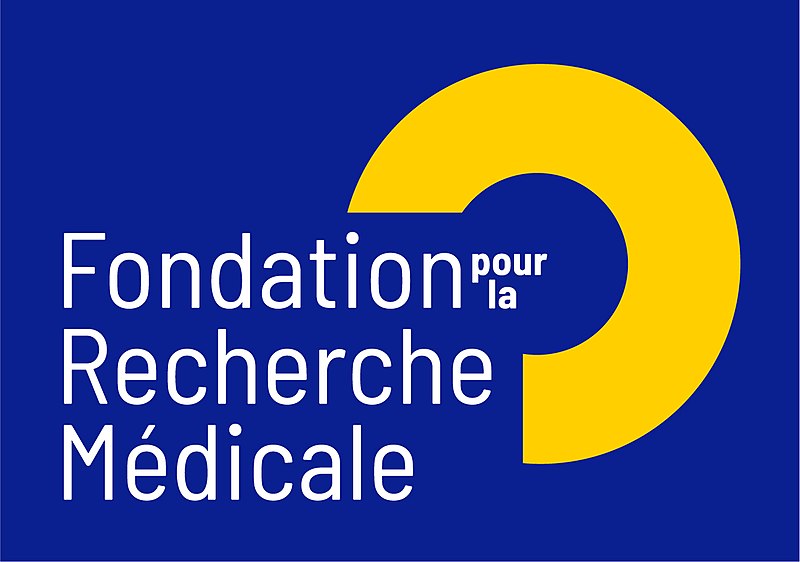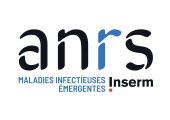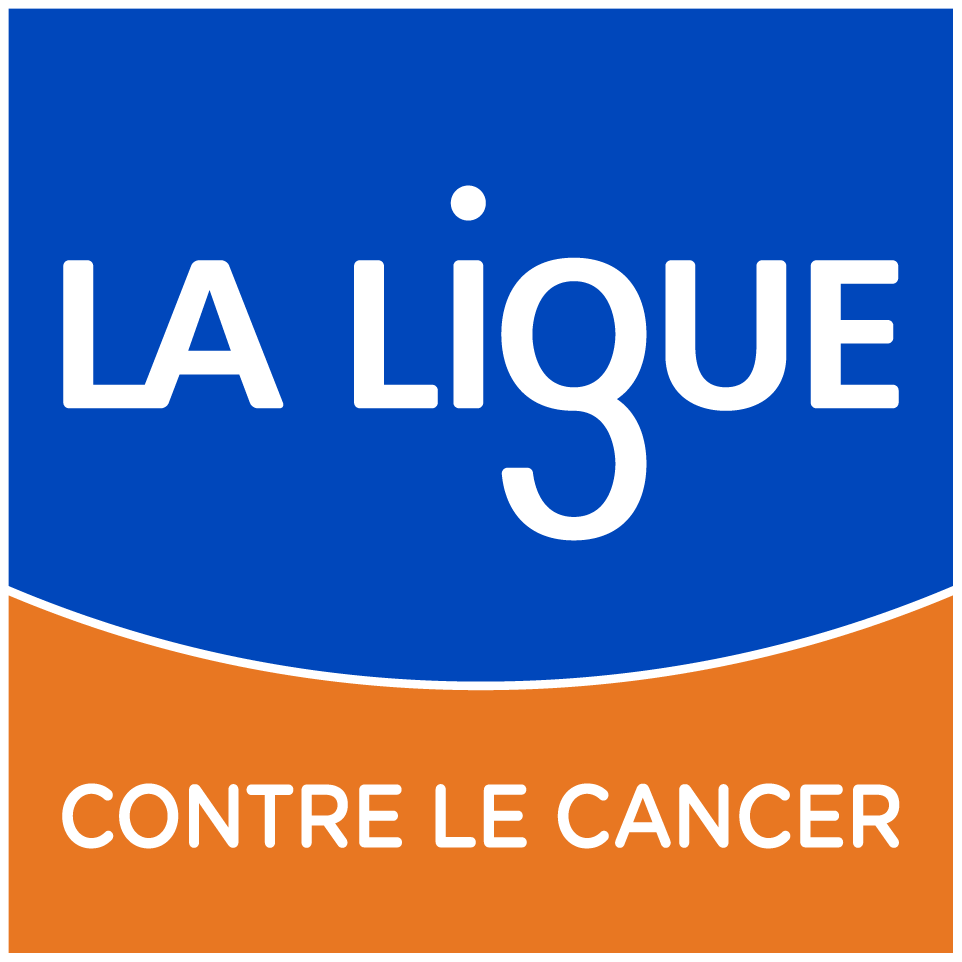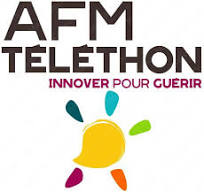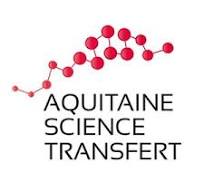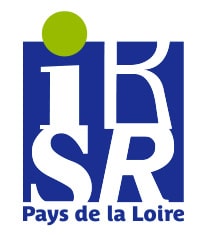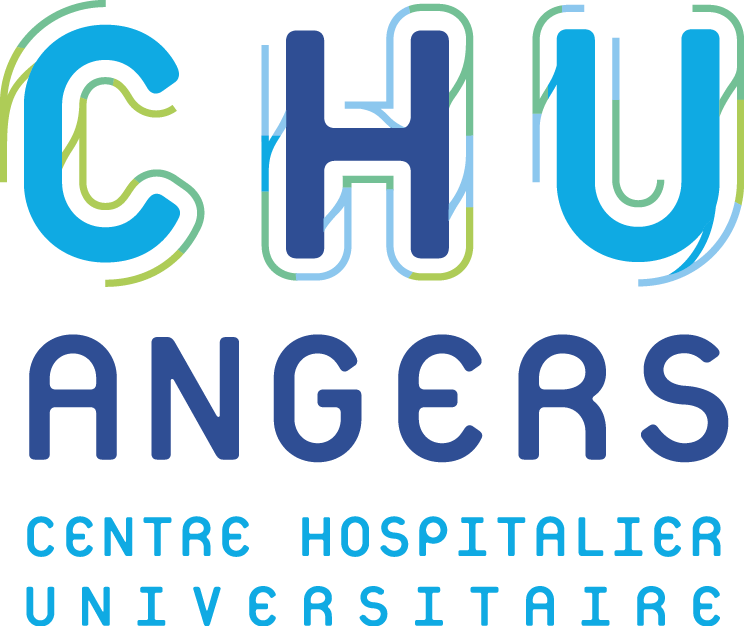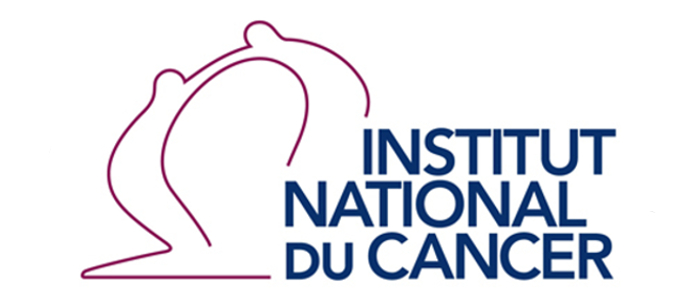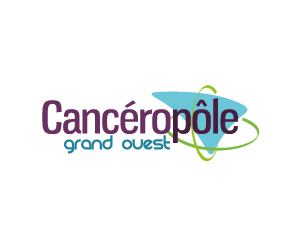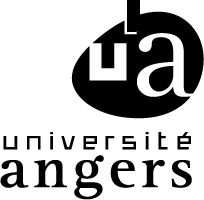Team 4
Innate Immunity and Cancer
Team leader : Yves Delneste
The team studies the innate immune system in physiological and pathological situations (cancer, chronic inflammatory diseases, acute and chronic infections).
Thanks to the clinicians integrated in the team, the projects are structured around a fundamental approach and a strong translational approach thanks to the collaborations set up with clinical services (CHU Angers, Institut de Cancérologie de l’Ouest Centre Paul Papin).
Historically, the team was interested in the biology of human macrophages and soluble receptors of innate immunity. More recently, in connection with the CRCI²NA thematic thread which aims at deciphering the tumor ecosystem, we have initiated projects addressing the links between tumor diversity and immune environment (dynamics of macrophage polarization).
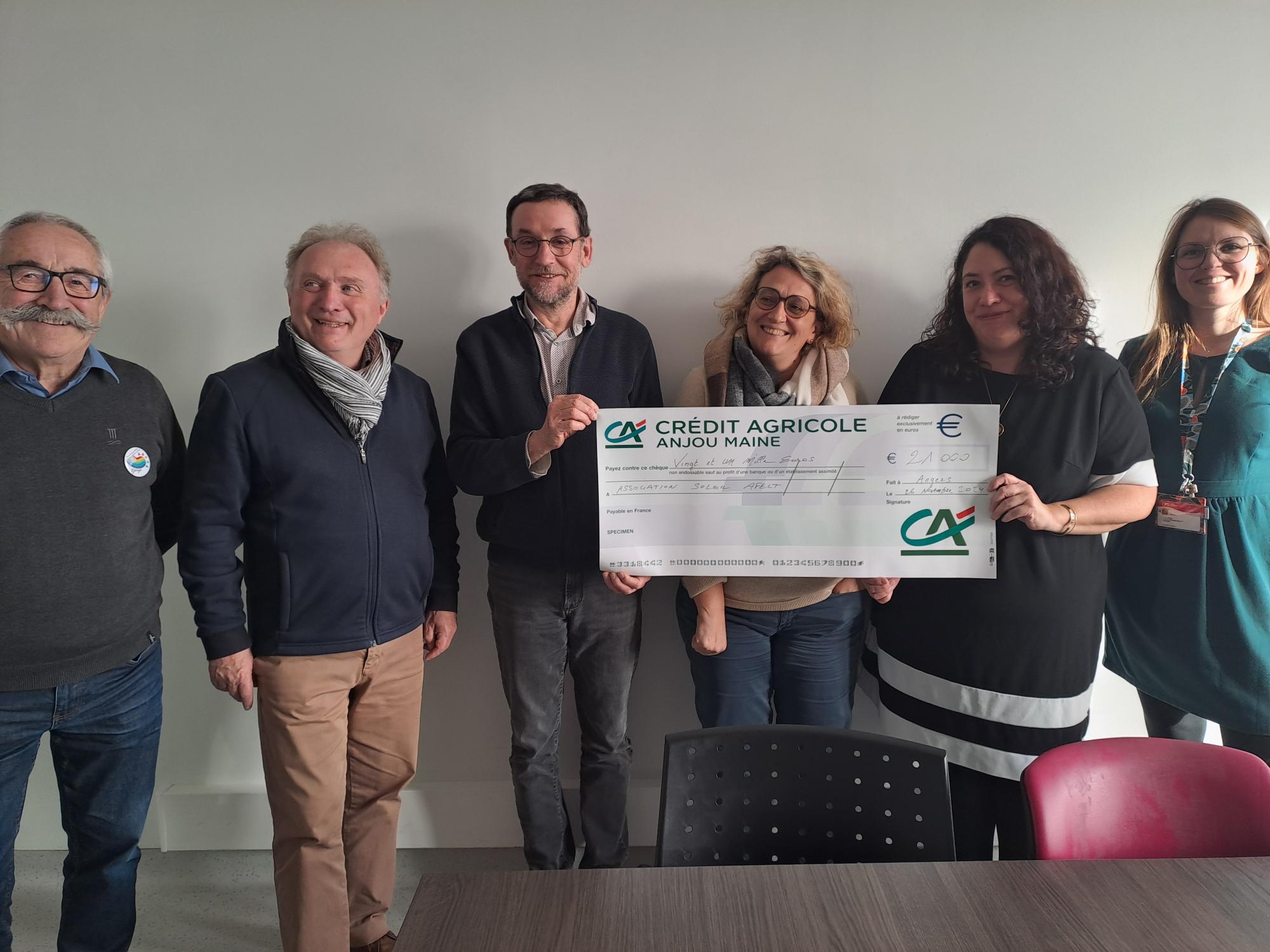
Thanks to the associations Soleil AFELT , Courage et force pour Johan and Crédit Agricole to support cancer research!
Research axes
1. Biology of human macrophages
Macrophages are myeloid cells present in all tissues. Acting as sentinels of the immune system, macrophages participate in a diversity of physiological mechanisms, such as antimicrobial defense, tissue repair and initiation/regulation of adaptive immune responses. A remarkable property of these cells is their plasticity, i.e. their ability to adapt their phenotype and functions to the nature of the signals encountered locally.
Our work aims at :
- Clarifying the role of metabolists and immunometabolism in the polarization of macrophages
- Identifying the mechanisms of survival in injured tissues
- Characterizing Identifying the mechanisms of generation and functions of tumor-associated macrophages.
In the recent past, the team has demonstrated the role of the cytokines M-CSF and IL-34 and of lactic acidosis in the generation of TAM-like macrophages.
Current projects aim to clarify (i) the diversity of TAMs in solid tumors (ovarian, lung) and hematological malignancies (see Axis 3) and (ii) the mechanisms of macrophage survival under stress.
2. Biology of soluble receptors of innate immunity
The soluble receptors of innate immunity (Pattern Recognition Molecules or PRM) act as opsonins involved in the clearance of microbes and dead cells and participate to the regulation of adaptive immune responses. Although they are central actors of the innate immune system, the biology of PRM remains largely unknown.
Our team recently idendified two new sPRM, namely IL-26 and clusterin.
Clusterin has been initially identified as an extracellular chaperone molecule involved in the disposal of misfolded molecules. We have demonstrated that clusterin acts as an oposonin involved in the clearance of late apoptotic cells and is a central player in the management of extracellular histones, which are critical danger molecules released by dying cells.
Initially identified as a pro-inflammatory cytokine, we have demonstrated that IL-26 behaves as a PRM modulating the inflammatory properties of nucleic acids.
3. Macrophages and myeloproliferative syndrome
Myeloproliferative neoplasms (MPN) are acquired clonal disorders characterized by an accumulation of mature blood cells. Their prognosis is linked to two major complications: short/medium term thrombosis and long-term hematological evolutions. Among the hematological evolutions, progression to secondary acute myeloid leukemia (AML) is associated with a dreadful prognosis. The bone marrow microenvironment plays a key role in the pathogenicity of MPN by increasing molecular instability and promoting fibrosis. Moreover, the myeloid compartment exhibits an inflammatory phenotype.
The team conducts basic and translational research to decipher the mutational landscape of MPN using multi-omic and functional approaches to (i) identify TAM subtypes in MPN and associate their phenotype with the diversity of MPN phenotypes and (ii) identify dysregulated pathways to identify new therapeutic targets (in vitro drug screening and in vivo PDX experiments). This emerging project, which relies on biocollections of patient’s samples (University hospital of Angers, national network FIMBANK) and unique expertise in TAM and MPN, is led by Damien Luque Paz and involve 6 french teams (funding INCa PRTK-2023-052 MOZART).
4. Functional genomics of cancer
Characterizing the genetic or epigenetic variations present in a patient's tumor represents a key step towards precision medicine. It is now clear that the response of cancer cells to anti-cancer agents and the emergence of resistant clones, will depend on a large number of factors, including the genetic background of both tumor and normal cells, tumor heterogeneity and immune infiltrate. This complex tumor ecosystem will be shaped by each course of treatment.
Our projects aim at deciphering the mutational and immunological landscapes of solid tumors (ovaries, lungs) and myeloid neoplasms (myeloproliferative neoplasms, acute myeloid leukemia) using multi-omics approaches, spatial transcriptomics and functional assays in order to improve the diagnosis, the prognostic evaluation, and the prediction of response to targeted therapy.
In line with these genomic approaches, we are developing bioinformatics and machine learning approaches as well as high-throughput functional assays to characterize the genetic alterations identified, with a focus on those affecting the non-coding regulatory regions of cancer genes.
This research is made possible by the recruitment of patients in the clinical services of the Angers University Hospital (CHU) and the Integrative Center for Oncology (ICO) and by a privileged access to specimens available in regional/national biobanks (FIMBANK, FHU GOAL).
Our Members
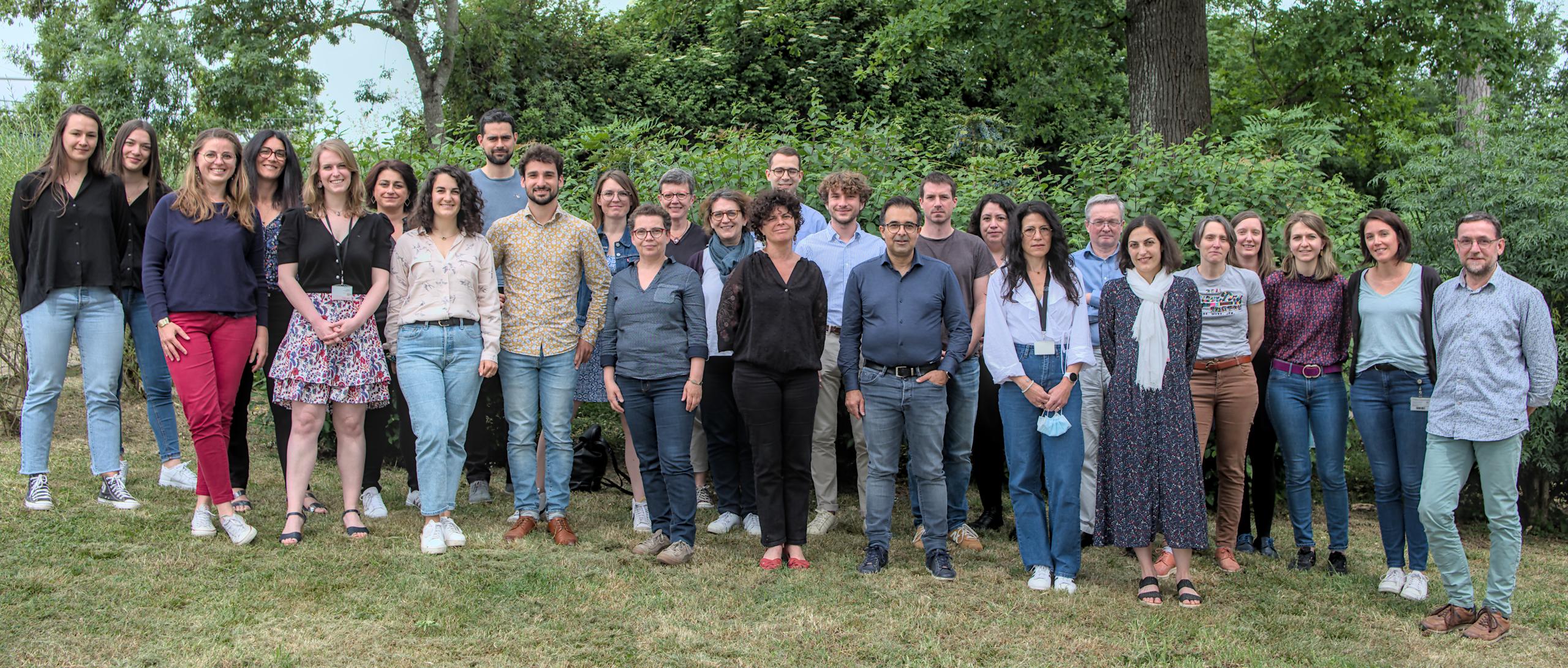
Team leaders :
Yves Delneste, DR INSERM
Pascale Jeannin, PU-PH
Team members :
Myriam Ammi, MCU-PH
Jean-François AUGUSTO, PU-PH
Céline BEAUVILLAIN, MCU-PH
Marie BEQUIN, Doctorante
Amandine BILLAUD Chercheur (ICO)
Simon BLANCHARD, I (CHU)
Odile BLANCHET, MCU-PH
Anne BOUVIER, PH
Benoit BRILLAND, MCU-PH
Louise-Marie CHEVALIER, PH
Marie Christine COPIN, PU-PH
Laurane COTTIN, PH
Dominique COUEZ, PU
Jonathan DAUVE, IR (ICO)
Cloé DEHOURS, Doctorant
Yves DELNESTE, DR
Mathilde HUNAULT, PU-PH
Pascale JEANNIN, PU-PH
Najia JEROUNDI, ATER
Grégoire JUSTEAU, PH
Fida KHATER, MCU
Chloe LEPROUT IE (Inserm)
Damien LUQUE PAZ, PU-PH
Alexandra MARIANDE, T (CHU)
Coralie MALLEBRANCHE, PH
Elena MENAND, IR (ICO)
Nathalie MERILLON, IE (CHU)
Charline MIOT, MCU-PH
Alain MOREL, PU-Em
Sandrine NAIL-BILLAUD, MCU
Corentin ORVAIN, PU-PH
Isabelle PELLIER, PU-PH
Pascale PIGNON, IE (Inserm)
Romain PINON, Doctorant
Caroline POLI, PH
Laurence PREISSER, IE (UA)
Arnaud QUENTEL, T (ICO)
Aline SCHMIDT-TANGUY, PU-PH
Raffaella SOLETI, IR Inserm
Isabelle TOURNIER, PU
Valérie UGO, PU-PH
Luisa VERGORI, IR (UA)
Pierre-Alexandre VID, Chercheur (ICO)
Emeline VINATIER, PH
Organization of the team
The team includes scientists, biologists and clinicians from different fields (immunology, hematology, nephrology) and expertise (cell biology, genomics/transcriptomics, etc.). The involvement of biologists and clinicians and the collaborations established with clinical units at Angers University Hospital, enable us to combine cognitive and translational research in each research projects.
The translational research activities are carried out within the framework of the Structuring Project 3I-Impact supported by the University Hospital of Angers and the University of Angers; this project aims at reinforcing the emergence and the structuring of research projects between university teams and health care structures in the field of alterations of the immune system in severe pathologies (cancer, sepsis, chronic inflammatory diseases)
The team is integrated in the Cancéropole Grand-Ouest and is a member of the Centre de Référence Déficits Immunitaires Héréditaires.
Contact us
CRCI²NA - Institut de Recherche et d’Ingénierie de la Santé,
4 Rue Larrey,
49100 Angers
+33 (0)2 44 68 83 00
yves.delneste@univ-angers.fr
Selected publications
2024 :
Glycogenesis and glyconeogenesis from glutamine, lactate and glycerol support human macrophage functions
Jeroundi N*, Roy C*, Basset L, Pignon P, Preisser L, Blanchard S, Bocca C, Abadie C, Lalande J, Gueguen N, Mabilleau G, Lenaers G, Moreau A, Copin MC, Tcherkez G, Delneste Y, Couez D*, Jeannin P*. . EMBO Reports. https://doi.org/10.1038/s44319-024-00278-4
A predictive mortality score in ANCA-associated renal vasculitis.
Fage N, Quéméneur T, Riou J, Boud'hors C, Desouche A, Vinatier E, Samoreau C, Coindre JP, Djema A, Henry N, Gnemmi V, Copin MC, Piccoli GB, Vandenbussche C, Augusto JF, Brilland B; Maine-Anjou Registry Research Group. Nephrology Dialysis Transplantation. 2024;39(9):1461-1472.
Association of MPL K39N and R102P heterozygous germline mutations lead to hereditary thrombocytosis.
Voirin E, Bouvier A, Plo I, Durix L, Beucher A, Giraudier S, Ugo V, Brasme JF, Luque Paz D. American Journal of Hematology. 2024;99(8):1644-1646.
Relative prognostic value of flow cytometric measurable residual disease before allogeneic hematopoietic cell transplantation for adults with MDS/AML or AML.
Orvain C, Ali N, Othus M, Rodríguez-Arbolí E, Milano F, Le CM, Sandmaier BM, Scott BL, Appelbaum FR, Walter RB. American Journal of Hematology. 2024;99(5):862-870.
CALR-mutated patients with low allele burden represent a specific subtype of essential thrombocythemia, a study on behalf of FIM and GBMHM.
Aubin L, Vilas Boas R, Daltro De Oliveira R, Le Brun V, Divoux M, Rey J, Mansier O, Ianotto JC, Pastoret C, Desmares A, Murati A, de Mas V, Tavitian S, Girodon F, Soret Dulphy J, Goncalves Monteiro V, Boyer F, Orvain C, Ranta D, Cayssials E, Le Clech L, Nicol C, Rottier C, Botin Lopez T, Castel B, Rispal P, Beziat G, Bescond C, Laribi K, Benajiba L, Ugo V, Lippert E, Cottin L*, Luque Paz D*. American Journal of Hematology. 2024;99(5):1001-1004.
p4EBP1 staining predicts outcome in ER-positive endocrine-resistant metastatic breast cancer patients treated with everolimus and exemestane.
Vanacker H, Treilleux I, Schiffler C, Bieche I, Campone M, Patsouris A, Arnedos M, Cottu PH, Jacquin JP, Dalenc F, Pinton A, Servant N, Attignon V, Rouleau E, Morel A, Legrand F, Jimenez M, Andre F, Bachelot T. Br J Cancer. 2024 Mar;130(4):613-619. doi: 10.1038/s41416-023-02549-8. Epub 2024 Jan 5. PMID: 38182687; PMCID: PMC10876520.
2023:
Relationship between comorbidities, mutational profile, and outcome after intensive chemotherapy in patients older than 60 years with acute myeloid leukemia: Assessment of different risk scores.
Bachelot A, Bouvier A, Riou J, Thepot S, Giltat A, Nunes Gomes C, Paillassa J, Jouanneau-Courville R, Renard M, Beucher A, Cottin L, Wiber M, Ribourtout B, Geneviève F, Luque Paz D, Tanguy-Schmidt A, Ugo V, Hunault-Berger M, Blanchet O, Orvain C. American Journal of Hematology. 2023;98(6):922-931.
Kidney injury molecule 1 (KIM-1): a potential biomarker of acute kidney injury and tubulointerstitial injury in patients with ANCA-glomerulonephritis.
Brilland B, Boud'hors C, Wacrenier S, Blanchard S, Cayon J, Blanchet O, Piccoli GB, Henry N, Djema A, Coindre JP, Jeannin P, Delneste Y, Copin MC*, Augusto JF*. Clinical Kidney Journal. 2023;16(9):1521-1533
MAGT1 deficiency in XMEN disease is associated with severe platelet dysfunction and impaired platelet glycoprotein N-glycosylation.
Kauskot A, Mallebranche C, Bruneel A, Fenaille F, Solarz J, Viellard T, Feng M, Repérant C, Bordet JC, Cholet S, Denis CV, McCluskey G, Latour S, Martin E, Pellier I, Lasne D, Borgel D, Kracker S, Ziegler A, Tuffigo M, Fournier B, Miot C*, Adam F*. Journal of Thrombosis and Haemostasis. 2023;S1538-7836(23)00420-8
Clusterin neutralizes the inflammatory and cytotoxic properties of extracellular histones.
Augusto JF*, Beauvillain C*, Poli C, Paolini L, Tournier I, Pignon P, Blanchard S, Preisser L, Soleti R, Delépine C, Monnier M, Douchet I, Asfar P, Beloncle F, Guisset O, Prével R, Mercat A, Vinatier E, Goret J, Subra JF, Couez D, Wilson MR, Blanco P, Jeannin P*, Delneste Y*. American Journal of Respiratory and Critical Care Medicine. 2023;208(2):176-187.
Editorial : Patel BV, Lee T, O'Dea K. CLUSTERINg circulating histones in sepsis. Am J Respir Crit Care Med. 2023;208(2):125-127.
Impact of clonal architecture on clinical course and prognosis in patients with myeloproliferative neoplasms.
Luque Paz D, Bader MS, Nienhold R, Rai S, Almeida Fonseca T, Stetka J, Hao-Shen H, Mild-Schneider G, Passweg JR, Skoda RC. Hemasphere. 2023;7(5):e885.
Association between kinetic of anti-neutrophil cytoplasmic antibody (ANCA), renal survival and relapse risk in ANCA-glomerulonephritis.
Samoreau C, Piccoli GB, Martin C, Gatault P, Vinatier E, Bridoux F, Riou J, Desouche A, Jourdain P, Coindre JP, Wacrenier S, Guibert F, Henry N, Blanchet O, Croué A, Djema A, Pouteau LM, Copin MC, Beauvillain C, Subra JF, Augusto JF, Brilland B. Nephrology Dialysis Transplantation. 2023;38(5):1192-1203.
Validation of the Clinical Use of GIScar, an Academic-developed Genomic Instability Score Predicting Sensitivity to Maintenance Olaparib for Ovarian Cancer.
Leman R, Muller E, Legros A, Goardon N, Chentli I, Atkinson A, Tranchant A, Castera L, Krieger S, Ricou A, Boulouard F, Joly F, Boucly R, Dumont A, Basset N, Coulet F, Chevalier LM, Rouleau E, Leitner K, González-Martin A, Gargiulo P, Lück HJ, Genestie C; PAOLA-1 investigators; Ray-Coquard I, Pujade-Lauraine E, Vaur D. Clin Cancer Res. 2023 Nov 1;29(21):4419-4429. doi:10.1158/1078-0432.CCR-23-0898. PMID: 37756555; PMCID: PMC10618649.
Comprehensive analyses of immune tumor microenvironment in papillary renal cellcarcinoma.
de Vries-Brilland M, Rioux-Leclercq N, Meylan M, Dauvé J, Passot C, Spirina-Menand E, Flippot R, Fromont G, Gravis G, Geoffrois L, Chevreau C, Rolland F, Blanc E, Lefort F, Ravaud A, Gross-Goupil M, Escudier B, Negrier S, Albiges L. J Immunother Cancer. 2023 Nov;11(11):e006885. doi:10.1136/jitc-2023-006885. PMID: 37935564; PMCID: PMC10649801.
2022 :
Genomics to select treatment for patients with metastatic breast cancer.
Andre F, Filleron T, Kamal M, Mosele F, Arnedos M, Dalenc F, Sablin MP, Campone M, Bonnefoi H, Lefeuvre-Plesse C, Jacot W, Coussy F, Ferrero JM, Emile G, Mouret-Reynier MA, Thery JC, Isambert N, Mege A, Barthelemy P, You B, Hajjaji N, Lacroix L, Rouleau E, Tran-Dien A, Boyault S, Attignon V, Gestraud P, Servant N, Le Tourneau C, Cherif LL, Soubeyran I, Montemurro F, Morel A, Lusque A, Jimenez M, Jacquet A, Gonçalves A, Bachelot T, Bieche I. Nature. 2022 Oct;610(7931):343-348. doi: 10.1038/s41586-022-05068-3. Epub 2022 Sep 7. PMID:36071165.
Assessment of renal risk score and histopathological classification for prediction of end-stage kidney disease and factors associated with change in eGFR after ANCA-glomerulonephritis diagnosis.
Brilland B, Boud'hors C, Copin MC, Jourdain P, Henry N, Wacrenier S, Djema A, Samoreau C, Coindre JP, Cousin M, Riou J, Croue A, Saint-André JP, Subra JF, Piccoli GB, Augusto JF. Frontiers in Immunology. 2022;13:834878.
IL-26 prevents HCV replication by interfering with viral RNA replication.
Beaumont E*, Larochette V*, Preisser L, Miot C, Pignon P, Blanchard S, Hansen BT, Dauve J, Poli C, Poranen MM, Lamourette P, Plaisance M, Morel A, Fickenscher H, Jeannin P*, Roingeard P*, Delneste Y*. Journal of Hepatology. 2022;76(4):822-831
JAK2 V617F polycythemia vera and essential thrombocythemia: dynamic clinical features associated with long-term outcomes.
Sureau L, Buors C, Ianotto JC, Boyer F , Tanguy-Schmidt A, Roy L, Cayssials E, Chomel JC , Chauveau A, Orvain C, Mansier O, Ranta D, Robles M, Gyan E, Hérault O, Nimubona S, Marchand T, Lippert E, Riou J, Ugo V*, Luque Paz D*. Blood Cancer Journal. 2021;11(7):135
2021:
Age‐related expression of IFN‐λ1 versus IFN-I and beta-defensins in the nasopharynx of SARS-CoV-2 infected individuals.
Gilbert C, Lefeuvre C, Preisser L, Pivert A, Soleti R, Blanchard S, Delneste Y, Ducancelle A, Couez D*, Jeannin P*. Frontiers in Immunology. 2021;12:750279
Acetoacetate protects macrophages from lactic acidosis-induced mitochondrial dysfunction by metabolic reprograming.
Adam C*, Paolini L*, Gueguen N, Mabilleau G, Preisser L, Blanchard S, Pignon P, Manero F, Le Mao M, Morel A, Reynier P, Beauvillain C, Delneste Y*, Procaccio V*, Jeannin P*.
Nature Communications. 2021;12(1):7115
Functional pre-therapeutic evaluation by genome editing of variants of uncertain significance of essential tumor suppressor genes.
Billaud A, Chevalier LM, Augereau P, Frenel JS, Passot C, Campone M, Morel A. Genome Medicine. 2021;13(1):174
Funding, Networks & Partners

